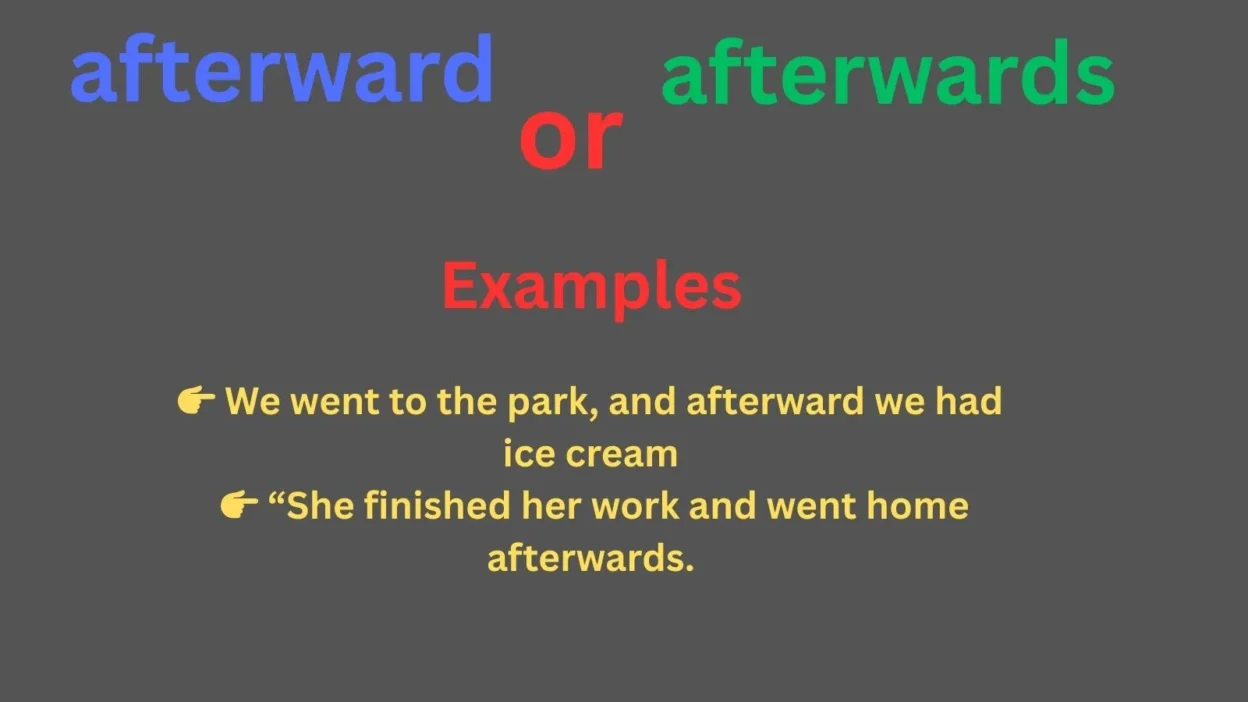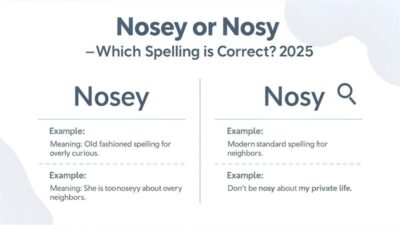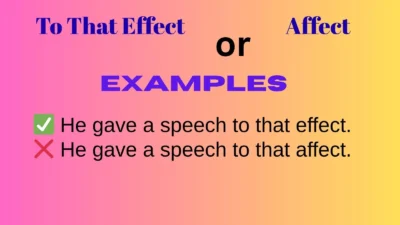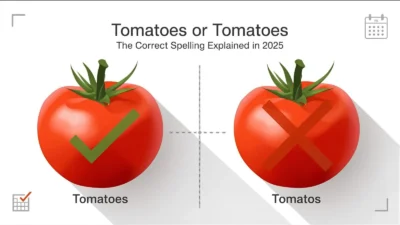Have you ever paused while writing and wondered whether to use “afterward” or “afterwards”? You are not alone. Thousands of people search for this question every month because the two forms look almost identical yet cause uncertainty.
Both words mean the same thing: “later” or “at a later time.” The confusion lies in regional spelling differences, style preferences, and formality levels.
Writers, students, and professionals want to avoid mistakes that make their text look inconsistent or “wrong.” Choosing the correct spelling matters, especially in emails, essays, blogs, and professional communication.
The keyword “afterward or afterwards” solves this exact doubt by giving you clarity. In this article, we will break down the quick answer, trace the origin of both forms, explain the US vs UK usage, show common mistakes, and share real-world examples.
By the end, you’ll know which spelling works best for your audience—so you can write with confidence.
Afterward or Afterwards – Quick Answer
Both “afterward” and “afterwards” mean the same thing: later in time.
- American English prefers afterward.
- British English prefers afterwards.
✅ Example (US): We went shopping, and afterward we had dinner.
✅ Example (UK): We went shopping, and afterwards we had dinner.
Both are correct—just pick the version that fits your audience.
The Origin of Afterward / Afterwards
The words come from Old English. “After” combined with the suffix -ward (meaning “direction”). Over time, an extra -s was added in Middle English, giving us “afterwards.”
- afterward = “in the direction of after” (later)
- afterwards = the same, but with an adverbial -s that was common in older English.
The extra -s stuck in British English but was dropped in American English, which prefers simpler forms.
British English vs American English Spelling
English spelling often differs between the US and the UK. Just like “toward/towards” or “forward/forwards,” the same rule applies here.
| Word | American English | British English | Example Sentence |
| Afterward | ✅ Preferred | Acceptable but rare | I’ll call you afterward. |
| Afterwards | ❌ Rare | ✅ Preferred | I’ll call you afterwards. |
Which Spelling Should You Use?
- If writing for a US audience: Use afterward.
- If writing for a UK or Commonwealth audience (Canada, Australia, India): Use afterwards.
- If writing for a global audience: Both are correct—choose one style and stay consistent.
Pro tip: Style guides (APA, MLA, Chicago) recommend sticking to one spelling throughout your work.
Common Mistakes with Afterward / Afterwards
❌ Mixing both in the same text: She left, and afterward she called afterwards.
✔️ Correct: Stick to one form consistently.
❌ Thinking one is wrong: Both are correct! The difference is regional.
❌ Adding unnecessary words: Afterwards later… (redundant).
✔️ Correct: Afterwards, she explained.
Afterward / Afterwards in Everyday Examples
- Email: Thank you for the meeting. I’ll follow up afterward.
- News report (UK): The Prime Minister spoke to reporters afterwards.
- Social media: Great workout! Feeling amazing afterward.
- Formal writing: The treaty was signed, and discussions continued afterwards.
Afterward or Afterwards – Google Trends & Usage Data
Google Trends shows:
- “Afterward” is most popular in the United States.
- “Afterwards” dominates in the UK, Australia, India, and most Commonwealth countries.
This proves spelling depends on geography, not meaning.
FAQs
Q1. Is afterward or afterwards correct?
Both are correct; it depends on whether you use US or UK English.
Q2. Do they mean different things?
No. Both mean “later” or “after a certain time.”
Q3. Is afterward more formal than afterwards?
Not really. The difference is regional, not formal vs informal.
Q4. Can I use afterwards in American writing?
Yes, but it may look unusual to American readers.
Q5. Which is more common worldwide?
“Afterwards” is more common globally, but “afterward” rules in the US.
Q6. Are there other words like this?
Yes—toward/towards, forward/forwards, upward/upwards.
Q7. Should I mix both in one text?
No. Pick one and stay consistent.
Conclusion
When choosing between “afterward” and “afterwards,” the key lies in your audience. Both mean the same thing, but spelling differs across regions.
Americans drop the “s,” while British and Commonwealth speakers keep it. Neither is wrong, but consistency matters. If you’re writing for a US audience, go with afterward.
If your readers are in the UK or other Commonwealth countries, choose afterwards. For international or mixed audiences, select one style and stick with it throughout.
Understanding this small but important spelling difference can make your writing clearer, more professional, and more trusted. So the next time you hesitate—remember: it’s not about right or wrong, but about who you’re writing for.

Hi, I’m Jason Carter, the author behind GrammarNestly.com.
I’m a grammar expert with a passion for helping readers understand the English language in a simple and practical way.
I love breaking down confusing grammar rules and turning them into easy, everyday lessons that anyone can follow.



